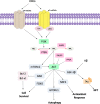Neuroprotective Effects of Cholinesterase Inhibitors: Current Scenario in Therapies for Alzheimer's Disease and Future Perspectives
- PMID: 35591949
- PMCID: PMC9108627
- DOI: 10.3233/ADR-210061
Neuroprotective Effects of Cholinesterase Inhibitors: Current Scenario in Therapies for Alzheimer's Disease and Future Perspectives
Abstract
Alzheimer's disease (AD) is a slowly progressive neurodegenerative disease conceptualized as a continuous process, ranging from mild cognitive impairment (MCI), to the mild, moderate, and severe clinical stages of AD dementia. AD is considered a complex multifactorial disease. Currently, the use of cholinesterase inhibitors (ChEI), such as tacrine, donepezil, rivastigmine, and galantamine, has been the main treatment for AD patients. Interestingly, there is evidence that ChEI also promotes neuroprotective effects, bringing some benefits to AD patients. The mechanisms by which the ChEI act have been investigated in AD. ChEI can modulate the PI3K/AKT pathway, which is an important signaling cascade that is capable of causing a significant functional impact on neurons by activating cell survival pathways to promote neuroprotective effects. However, there is still a huge challenge in the field of neuroprotection, but in the context of unravelling the details of the PI3K/AKT pathway, a new scenario has emerged for the development of more efficient drugs that act on multiple protein targets. Thus, the mechanisms by which ChEI can promote neuroprotective effects and prospects for the development of new drug candidates for the treatment of AD are discussed in this review.
Keywords: Acetylcholinesterase; PI3K/AKT pathway; butyrylcholinesterase; neurodegenerative diseases; neuroprotection.
© 2022 – The authors. Published by IOS Press.
Conflict of interest statement
The authors have no conflict of interest to report.
Figures







Similar articles
-
Comparison of cholinesterase inhibitor utilization patterns and associated health care costs in Alzheimer's disease.J Manag Care Pharm. 2008 Jun;14(5):451-61. doi: 10.18553/jmcp.2008.14.5.451. J Manag Care Pharm. 2008. PMID: 18597574 Free PMC article.
-
Cholinesterase inhibitors in the treatment of Alzheimer's disease: a comparison of tolerability and pharmacology.Drug Saf. 1998 Dec;19(6):465-80. doi: 10.2165/00002018-199819060-00004. Drug Saf. 1998. PMID: 9880090 Review.
-
Pharmacotherapeutic approaches to the treatment of Alzheimer's disease.Clin Ther. 2004 May;26(5):615-30. doi: 10.1016/s0149-2918(04)90064-1. Clin Ther. 2004. PMID: 15220008 Review.
-
Cholinesterase inhibitors used in the treatment of Alzheimer's disease: the relationship between pharmacological effects and clinical efficacy.Drugs Aging. 2004;21(7):453-78. doi: 10.2165/00002512-200421070-00004. Drugs Aging. 2004. PMID: 15132713 Review.
-
Recent Developments in Tacrine-based Hybrids as a Therapeutic Option for Alzheimer's Disease.Mini Rev Med Chem. 2023;23(7):869-880. doi: 10.2174/1389557523666221201145141. Mini Rev Med Chem. 2023. PMID: 36464869 Review.
Cited by
-
Natural Products and Their Neuroprotective Effects in Degenerative Brain Diseases: A Comprehensive Review.Int J Mol Sci. 2024 Oct 18;25(20):11223. doi: 10.3390/ijms252011223. Int J Mol Sci. 2024. PMID: 39457003 Free PMC article. Review.
-
The Role of Dietary Antioxidants and Their Potential Mechanisms in Alzheimer's Disease Treatment.Metabolites. 2023 Mar 17;13(3):438. doi: 10.3390/metabo13030438. Metabolites. 2023. PMID: 36984879 Free PMC article. Review.
-
Boosting Acetylcholine Signaling by Cannabidiol in a Murine Model of Alzheimer's Disease.Int J Mol Sci. 2024 Nov 1;25(21):11764. doi: 10.3390/ijms252111764. Int J Mol Sci. 2024. PMID: 39519315 Free PMC article.
-
CRISPR in Neurodegenerative Diseases Treatment: An Alternative Approach to Current Therapies.Genes (Basel). 2025 Jul 22;16(8):850. doi: 10.3390/genes16080850. Genes (Basel). 2025. PMID: 40869897 Free PMC article. Review.
-
The Effect of a Tribulus-Based Formulation in Alleviating Cholinergic System Impairment and Scopolamine-Induced Memory Loss in Zebrafish (Danio rerio): Insights from Molecular Docking and In Vitro/In Vivo Approaches.Pharmaceuticals (Basel). 2024 Feb 2;17(2):200. doi: 10.3390/ph17020200. Pharmaceuticals (Basel). 2024. PMID: 38399415 Free PMC article.
References
-
- Sperling RA, Aisen PS, Beckett LA, Bennett DA, Craft S, Fagan AM, Iwatsubo T, Jack CR, Kaye J, Montine TJ, Park DC, Reiman EM, Rowe CC, Siemers E, Stern Y, Yaffe K, Carrillo MC, Thies B, Morrison-Bogorad M, Wagster MV, Phelps CH (2011) Toward defining the preclinical stages of Alzheimer’s disease: Recommendations from the National Institute on Aging-Alzheimer’s Association workgroups on diagnostic guidelines for Alzheimer’s disease. Alzheimers Dement 7, 280–292. - PMC - PubMed
-
- Alzheimer’s Disease International (ADI). Dementia statistics. https://www.alzint.org/about/dementia-facts-figures/dementia-statistics/
Publication types
LinkOut - more resources
Full Text Sources

